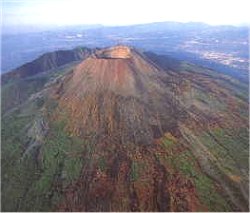
October Editorial
Pliny's account of the eruption of Vesuvius

October Editorial
Pliny's account of the eruption of Vesuvius
|
|
On the 24th of August 79 AD there was a massive volcanic eruption of Mount Vesuvius near Naples. The explosion was so large that the whole top of the mountain literally blew off. The eruption produced tons of ash and molten debris. Until the eruption, most of the people living around the mountain, and even on its slopes, had no idea that the mountain was a volcano, let alone an active one. As a result of the eruption the entire cities of Pompeii and Herculaneum as well as the villas of the wealthy at Stabiae were buried. Many of the inhabitants were unable to flee and were killed, many by pyroclastic flows. Others were caught in the open and buried by ash. Their bodies, or rather the space in the compressed ash where the bodies had been were perfectly preserved, and when plaster was poured into the spaces the casts showed men and women, often hastily dressed, lying exactly where they fell all those years ago. The cites remained buried under the volcano for almost 1700 years and today give archaeologists and visitors alike fascinating glimpses into the vanished world of ancient Rome. At the time of eruption the Roman senator and writer, Pliny the younger, was seventeen years old. He later gave a very accurate account of the eruption which has survived to this day in the form of two letters which he wrote to his friend, the historian Tacitus. Here are the extracts of his accounts, showing how a volcano seemed to an ancient Roman: The cloud was rising from a mountain - at such a distance we couldn't tell which, but afterwards learned that it was Vesuvius. I can best describe its shape by likening it to a pine tree. It rose into the sky on a very long "trunk" from which spread some "branches." I imagine it had been raised by a sudden blast, which then weakened, leaving the cloud unsupported so that its own weight caused it to spread sideways. Some of the cloud was white, in other parts there were dark patches of dirt and ash. ... Broad sheets of flame were lighting up many parts of Vesuvius; their light and brightness were the more vivid for the darkness of the night... The buildings were being rocked by a series of strong tremors, and appeared to have come loose from their foundations and to be sliding this way and that. Outside, however, there was danger from the rocks that were coming down, light and fire-consumed as these bits of pumice were ... It was daylight now elsewhere in the world, but there the darkness was darker and thicker than any night ... Then came a smell of sulphur, announcing the flames, and the flames themselves. This first account is of the events in the immediate vicinity of Vesuvius where Pliny's uncle was stationed. Although his uncle did not survive the eruption, Pliny the younger received the account from sailors who managed to escape and described the events. He himself lived with his mother in Misenum some few miles from Pompeii. In his second letter to Tacitus he described his own account of the events in his town, which fortunately was distant enough not be destroyed by the eruption but still close enough to experience the strong effects of the volcano: There had been tremors for many days previously, a common occurrence in Campania and no cause for panic. But that night the shaking grew much stronger; people thought it was an earthquake, not just a tremor ... Now the day begins, with a still hesitant and almost lazy dawn. All around us buildings are shaken .... In addition, it seemed as though the sea was being sucked backwards, as if it were being pushed back by the shaking of the land. Certainly the shoreline moved outwards, and many sea creatures were left on dry sand. Behind us were frightening dark clouds, rent by lightning twisted and hurled, opening to reveal huge figures of flame. These were like lightning, but bigger ... Now came the dust, though still thinly. I look back: a dense cloud looms behind us, following us like a flood poured across the land. We had scarcely sat down when a darkness came that was not like a moonless or cloudy night, but more like the black of closed and unlighted rooms ... It grew lighter, though that seemed not a return of day, but a sign that the fire was approaching. The fire itself actually stopped some distance away, but darkness and ashes came again, a great weight of them ... At last the cloud thinned out and dwindled to no more than smoke or fog. Soon there was real daylight. The sun was even shining, though with the lurid glow it has after an eclipse. The sight that met our still terrified eyes was a changed world, buried in ash like snow. |
| _______________________________ | ||||
| Home | | | Shopping | | | Database |
© Biscuit Software 2004-2015
All rights reserved